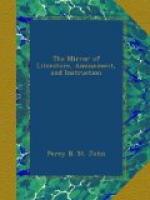Not yet aware that the higher we rise in rank, the harder we find it to be virtuous, he was for ever flattering himself with the future. Now, his conduct was to be such as should edify the whole body of the magistracy of Ispahan, of which he was become the head. He would not be satisfied with going to Mecca to visit the black stone, the temple of Kaaba, and purifying himself in the waters of Zim-zim, the miraculous spring which God caused to issue from the earth for Agar, and her son Ismael. He would do more; he would distribute a double zekath[4] to the poor, and win back for the divan-beghi the noble title which the people gave to the mechanic of the suburb of Julfa.
The first judgment which he pronounced as divan-beghi, bore evidence of this excellent resolution; but an unfortunate event occurred, which proved the truth of the following verse of the renowned Ferdusi, in his poem of the “Schah-nameh."[5]
“Our first fault, like the prolific poppy of Aboutige, produces seeds innumerable. The wind wafts them away, and we know not where they fall, or when they may rise; but this we know, they meet us at every step upon the path of life, and strew it with plants of bitterness.”
The royal aigrette of Schah Abbas was again broken, and immediately confided to an old comrade of Bebut. He had not, however, the surname of “Honest,” and his work was consequently subjected to a cautious scrutiny. Now, it was discovered that a very fine diamond had been taken from the jigha and fraudulently replaced; the unfortunate jeweller was arrested and dragged to the tribunal of the divan-beghi. The ambitious Bebut felt that there was no chance for him if he did not hurry the affair to an immediate close. He forthwith condemned his innocent fellow-labourer to the punishment due to his own iniquity, and the sentence was executed on the instant.
His conscience told him that a man like him was unworthy to administer justice to his fellow-citizens. A pilgrimage to Mecca would now no longer suffice to appease his remorse; his ambition told him it could be lulled by nothing but luxury and splendour. By severe exactions, he amassed large sums; and by gifts contrived to gain over the most influential members of the divan; he thus got appointed Khan of Schamachia, and, from the modest distinctions of the judicature, he passed to the turbulent honours of military power—a change by no means rare in Persia.
Abbas was then collecting all his forces to march against the province of Kandahar, and to reduce the Afghans, who have since ruled over his descendants. In the battles fought on this occasion, Bebut the Ambitious gained the signal favour of one equally ambitious; for Abbas was an indefatigable conqueror, whom fortune, with all her favours, could never satisfy.
The Khan of Schamachia was so thoroughly devoted to his master, so blindly subservient to his will, that he presently became his confidant. He was the very man for the favour of a despot; he had no opinion of his own, and could always find good reasons for those to which he assented. This, in the eyes of Abbas, constituted an excellent counsellor.




